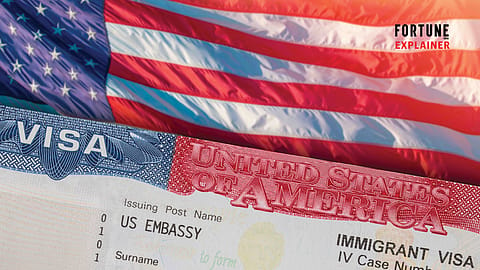Fortune India Explainer: H-1B visa fee hike challenged in a U.S. court—What does the lawsuit say?
In response to U.S. President Trump’s proclamation to increase the fees for new H-1B visas, healthcare recruiters, unions, religious organisations—and not IT companies—have knocked on the doors of the court.

The September 19th Proclamation by U.S. President Donald Trump to increase the fees for new H-1B visas to $100,000 has now been challenged in the District Court of the Northern District of California. It’s not the IT companies that have knocked on the doors of the court, but healthcare recruiters, unions and religious organisations. Here are all the details that you need to know about the lawsuit.
Who are the people challenging the U.S. administration?
Global Nurse Force—a California-based LLP which provides healthcare sector with nursing talent, the local and the international chapters of United Automobile, Aerospace And Agricultural Implement Workers of America—a labour union whose members include higher education graduate students, postdoctoral scientists, researchers, university staff, and faculty across several leading Universities in the U.S., American Association of University Professors—a non-profit membership association and labour union of faculty and academic professionals and religious organisations such as Society of the Divine Word—Chicago Province, Fathers of St. Charles along with six others have filed the suit against Trump and other senior administration officials stop the roll-out slated next year.
Why are they challenging the changes to the H-1B visa?
Talent sourcing companies, unions and religious organisations are alleging that the President has no authority to unilaterally alter the comprehensive statutory scheme for H-1B visa created by Congress. They also allege that he has no authority to unilaterally impose fees, taxes or other mechanisms to generate revenue for the United States, nor to dictate how those funds are spent. The ilk also alleges that certain discretionary powers that emanate from the proclamation can lead to corruption.
The plaintiffs in their suit argue that the H-1B Visa, created by Congress, ensures that the U.S. can attract necessary workers in speciality occupations. And its design already includes protections for U.S. workers, while also balancing the needs of both the private and public sectors. They say it is the U.S. Congress that has established a detailed fee system for H-1Bs, which sets parameters on fees and their use. They claim that Trump’s powers to restrict entry under the Immigration and Nationality Act cannot override Congress’s comprehensive H-1B Statute. They also allege that the Proclamation has been based on multiple factual errors and ignores the benefits of the H-1B Program to the American economy.
What impact do they see for the U.S. from the visa fee hike?
While Global Nurse Force—which offers a direct-hire model to U.S.-based healthcare systems and sponsors H-1B speciality worker visas—sees its U.S. operation closing if it has to pay an additional $100,000 fee for each nurse. Without access to international nurses, it sees a reduction in the healthcare capacity in ICUs, emergency rooms and surgical units, with wait times increasing.
“This proclamation directly threatens Global Nurse Force’s operations and forces hospitals towards staffing models that are significantly more expensive—raising healthcare costs rather than reducing them, so that the ultimate victims are patients, especially in rural and inner- city communities,” reads a paragraph in the suit.
Research and academic institutions, along with related unions, say that many of their members may lose their ability to live and work in the United States due to the Proclamation, which in turn will result in halted research programs. They also observe the erosion of educational institutions’ ability to hire highly qualified, experienced teachers, which could lead to a teacher shortage in the US, including in public schools. Religious organisations view the hike in visa restrictions as a hindrance to growth and a hindrance to the broader impact of the churches.
What is the relief being sought from the U.S. District Court?
The lawsuit seeks to have the court declare the proclamation and the upfront payment of $100,000 as a condition for adjudication of an H-1B petition—or for visa issuance or entry into the United States—as unlawful. They also want any guidelines or procedures issued in response to the proclamation to be set aside and declared unlawful. It also seeks an order from the court to compel the U.S. government to process H-1B petitions under existing law without the $100,000 payment condition.